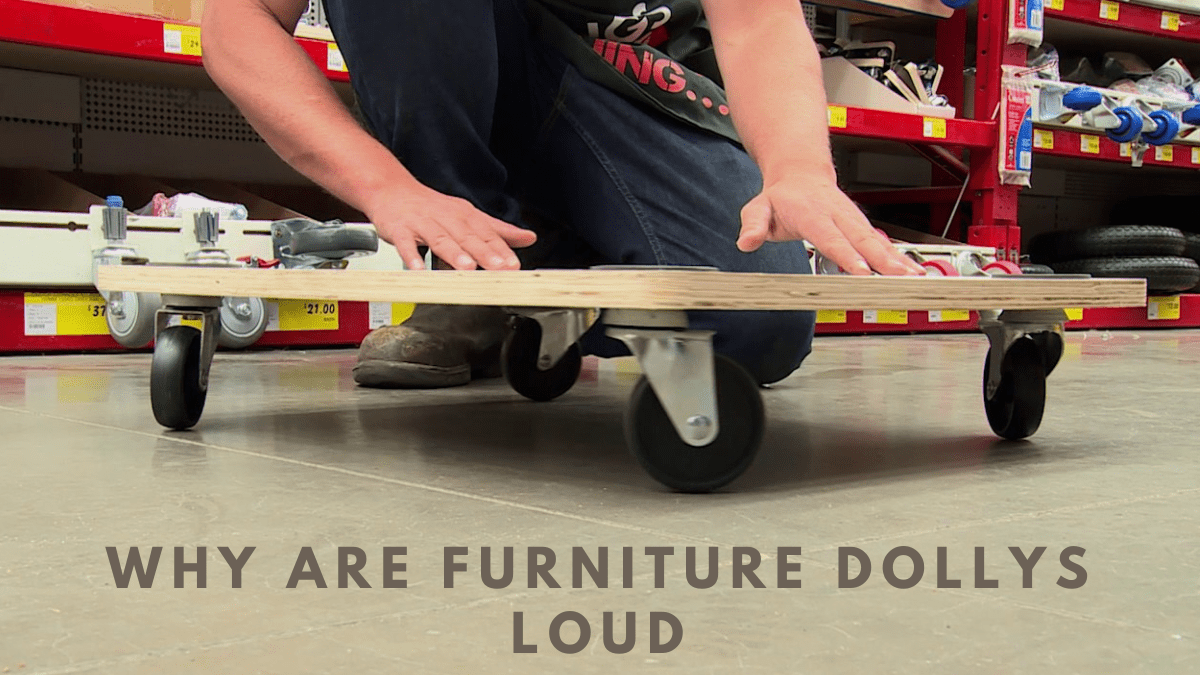Table of Contents
Why are Furniture Dollys Loud? Moving heavy items with a furniture dolly can make life easier, but the loud rolling sounds can be frustrating, especially on hard floors. If you’re tired of the noise and want a quieter moving experience, learning how to quiet your furniture dolly is critical. Why are Furniture Dollys Loud? In this article, we’ll explore practical solutions to minimize the sound from a furniture dolly, ensuring a smoother and quieter move without the hassle.
Why are Furniture Dollys Loud

To understand Why are Furniture Dollys Loud, it’s helpful to know why they’re noisy in the first place. There are a few main reasons:
- Hard Wheels: Many furniture dollys come with hard plastic or metal wheels, which create more noise, especially on hard surfaces.
- Heavy Loads: The weight of heavy furniture or boxes on the dolly amplifies the noise as the pressure pushes the wheels firmly against the floor.
- Uneven Surfaces: Rolling over tiles, wood floors, or other uneven surfaces can cause the dolly to rattle, adding to the overall noise.
Understanding these factors can guide you in choosing the right solutions to quiet your furniture dolly.
Read more: Why are Furniture Dollys Loud: Solutions to Minimize Rolling Sounds
Solution 1: Replace or Upgrade Dolly Wheels
One of the most effective ways to quiet your furniture dolly is to replace or upgrade the wheels. Why are Furniture Dollys Loud? Hard wheels are one of the primary noise sources, so switching to quieter materials can make a big difference.
Rubber Wheels for Noise Reduction
Rubber wheels are softer than plastic or metal, producing less noise on most surfaces. This wheel absorbs impact better, making for a quieter rolling experience.
- Softer Sound on Hard Floors: Rubber wheels reduce the clattering sounds that usually occur on tile or hardwood floors.
- Better Grip: Besides being quieter, rubber wheels offer better grip, making moving large items safer.
Consider Pneumatic Wheels for Extra Cushioning
Why are Furniture Dollys Loud? Pneumatic wheels, which are air-filled, provide additional cushioning, which helps minimize noise even further. They are instrumental on rough surfaces like concrete.
- Ideal for Bumpy Surfaces: These wheels are great for outdoor moves or for surfaces that could be smoother.
- Quieter and Smoother Ride: The air inside the wheels acts as a cushion, softening each rotation and reducing the impact noise.
Upgrading to quieter wheels can significantly reduce the noise and make your furniture dolly much more enjoyable.
Check out this: Why Dachshunds Are the Worst Breed: Uncovering the Flaws
Solution 2: Use Mats or Rugs on Hard Floors
If replacing wheels is not an option, placing mats or rugs along the path you’ll be moving can help quiet your furniture dolly. Why are Furniture Dollys Loud? This method works well for short moves within a room or across a hallway.
Lay Down Rubber Mats for Temporary Use
Rubber mats protect floors and reduce noise when moving heavy items across hard surfaces.
- Noise Absorption: Rubber absorbs the sound from the dolly wheels, reducing the loudness of each roll.
- Floor Protection: Mats make your dolly quieter and protect floors from potential scratches caused by hard wheels.
Use a Rug as a Sound Buffer
If you don’t have rubber mats, use any available rug to help buffer the sound. Rugs offer a soft surface that dampens the impact of the wheels, making the dolly quieter.
- Great for Quick Moves: Rugs are easy to place and remove, making them ideal for small moves.
- Affordable Solution: Using rugs is a simple and budget-friendly way to reduce noise without extra tools.
Using mats and rugs can give you a temporary solution to quiet your furniture dolly and protect your floors.
Solution 3: Maintain Your Dolly Regularly
Regular maintenance is an easy way to reduce noise over time. Dust and dirt buildup in the wheels can cause more friction, leading to rattling and louder sounds when moving items.
Clean Wheels to Reduce Friction
Dirt, dust, or debris caught in the wheels can make your furniture dolly louder than it should be. Cleaning the wheels removes this buildup and ensures smoother, quieter motion.
- Use a Damp Cloth: Wipe the wheels with a damp cloth regularly to remove any buildup.
- Check for Damage: Inspect the wheels for cracks or wear, as damaged wheels can add to noise.
Lubricate Moving Parts for Smoother Motion
If your dolly has metal parts or axles, applying lubricant can help reduce noise by making the movement smoother.
- Use Silicone Spray: Silicone spray works well for most dollies, as it doesn’t attract dust.
- Apply Sparingly: A small amount of lubricant goes a long way and prevents rattling.
Maintaining your furniture dolly can keep it rolling smoothly and help reduce any noise caused by wear and tear.
See this Article: Can You Mow Wet Grass? 5 Reasons Why You Should Not
Solution 4: Move Slowly and Steadily

One easy way to quiet your furniture dolly without extra equipment is to move at a slower, steady pace. Why are Furniture Dollys Loud? Rapid movements tend to create more noise as the dolly bumps and rattles over the floor.
Control the Speed
Moving slowly reduces the impact force of the wheels on the floor, which helps prevent loud noises from sudden bumps.
- Avoid Sudden Movements: Quick shifts or turns can make the dolly rattle, so try to keep movements smooth and controlled.
- Lower Impact on Floors: Slow movement minimizes the pressure on the wheels and reduces noise levels.
Practice Steady Handling
Keeping a steady hand on the dolly helps it roll more smoothly, reducing the chances of creating extra noise from unexpected jolts.
- Maintain Control: Keep a firm grip and avoid lifting or jerking the dolly while moving.
- Use Your Body Weight: Lean slightly to guide the dolly smoothly instead of pushing too hard, which can prevent rattling.
By adopting a slower and steadier approach, you can reduce the noise from your furniture dolly without spending extra on modifications.
Why are Furniture Dollys Loud? Quieting your furniture dolly can make moving a more pleasant experience for everyone involved. Whether you upgrade to rubber or pneumatic wheels, use mats, maintain your dolly, or move slowly, each solution can help minimize rolling sounds. Why are Furniture Dollys Loud? Now that you know these practical methods, you can quiet your furniture dolly and enjoy a smoother, quieter move every time.

